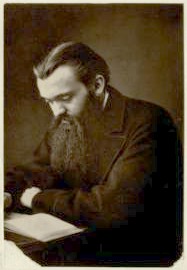William Kingdon Clifford
William Kingdon Clifford (4 May 1845 – 3 March 1879) was an English mathematician and philosopher, best known for his work in geometric algebra, the Clifford algebra, which is named after him. His ideas also had a profound influence on the development of algebraic topology and the foundation of geometric theory.
Biography[edit | edit source]
William Kingdon Clifford was born in Exeter, England, in 1845. He was educated at King's College London and later at Trinity College, Cambridge, where he was elected a Fellow. Clifford was known for his abilities in both mathematics and philosophy from a young age. Despite his short life, Clifford made significant contributions to the field of mathematics and the philosophy of science.
Mathematical Contributions[edit | edit source]
Clifford's most notable contribution to mathematics was the development of what is now known as Clifford algebra. This algebraic structure extends the complex numbers and quaternions, providing a framework for understanding the geometry of spaces of higher dimensions. Clifford algebras have applications in various areas of mathematics and physics, including quantum mechanics and general relativity.
In addition to his work on Clifford algebras, Clifford made contributions to non-Euclidean geometry and was one of the early proponents of the geometric interpretation of algebraic topology. He also introduced what is now known as Clifford's theorem in algebraic curves.
Philosophical Contributions[edit | edit source]
Clifford was also deeply interested in the philosophy of science and ethics. He is well-known for his essay "The Ethics of Belief," in which he argued that it is wrong to believe anything on insufficient evidence. This essay has been influential in the development of evidentialism in epistemology.
Clifford's philosophical views were closely tied to his scientific work. He believed that the physical world is composed of small units of matter and energy, which he called "mind-stuff." According to Clifford, this concept could explain both physical phenomena and consciousness, a theory that anticipated some aspects of modern physicalism.
Legacy[edit | edit source]
William Kingdon Clifford died in 1879 at the age of 33. Despite his brief career, Clifford's work has had a lasting impact on mathematics and philosophy. The Clifford algebra, in particular, remains a vital area of research in mathematics and physics. Clifford's philosophical writings, especially "The Ethics of Belief," continue to be studied and debated by philosophers.
Clifford was a member of the Metaphysical Society, a group that included many prominent thinkers of the time, such as Alfred Lord Tennyson, Thomas Henry Huxley, and William James. His interactions with these figures helped to spread his ideas beyond the realm of mathematics.
Selected Works[edit | edit source]
- Elements of Dynamic (1878)
- Lectures and Essays (1879), edited by Leslie Stephen and Frederick Pollock
See Also[edit | edit source]
Search WikiMD
Ad.Tired of being Overweight? Try W8MD's physician weight loss program.
Semaglutide (Ozempic / Wegovy and Tirzepatide (Mounjaro / Zepbound) available.
Advertise on WikiMD
|
WikiMD's Wellness Encyclopedia |
| Let Food Be Thy Medicine Medicine Thy Food - Hippocrates |
Translate this page: - East Asian
中文,
日本,
한국어,
South Asian
हिन्दी,
தமிழ்,
తెలుగు,
Urdu,
ಕನ್ನಡ,
Southeast Asian
Indonesian,
Vietnamese,
Thai,
မြန်မာဘာသာ,
বাংলা
European
español,
Deutsch,
français,
Greek,
português do Brasil,
polski,
română,
русский,
Nederlands,
norsk,
svenska,
suomi,
Italian
Middle Eastern & African
عربى,
Turkish,
Persian,
Hebrew,
Afrikaans,
isiZulu,
Kiswahili,
Other
Bulgarian,
Hungarian,
Czech,
Swedish,
മലയാളം,
मराठी,
ਪੰਜਾਬੀ,
ગુજરાતી,
Portuguese,
Ukrainian
Medical Disclaimer: WikiMD is not a substitute for professional medical advice. The information on WikiMD is provided as an information resource only, may be incorrect, outdated or misleading, and is not to be used or relied on for any diagnostic or treatment purposes. Please consult your health care provider before making any healthcare decisions or for guidance about a specific medical condition. WikiMD expressly disclaims responsibility, and shall have no liability, for any damages, loss, injury, or liability whatsoever suffered as a result of your reliance on the information contained in this site. By visiting this site you agree to the foregoing terms and conditions, which may from time to time be changed or supplemented by WikiMD. If you do not agree to the foregoing terms and conditions, you should not enter or use this site. See full disclaimer.
Credits:Most images are courtesy of Wikimedia commons, and templates, categories Wikipedia, licensed under CC BY SA or similar.
Contributors: Prab R. Tumpati, MD






